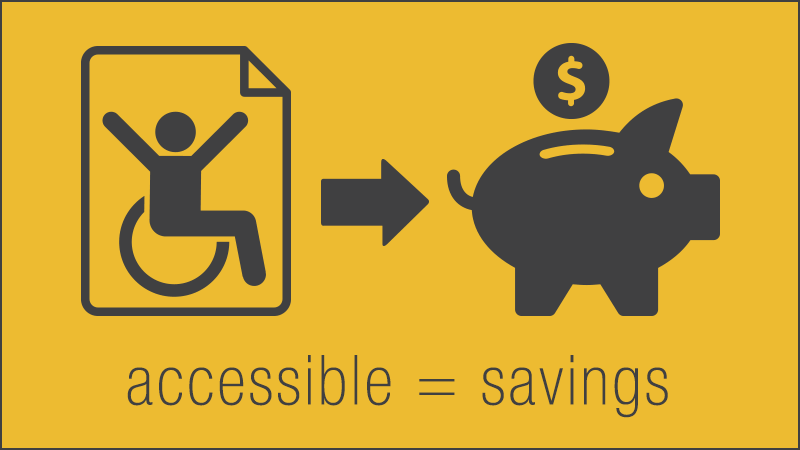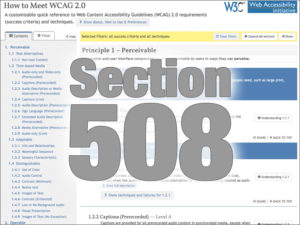
Insuring accessibility to your Plan is not only good engagement, but also the law. Failure to comply is time consuming and costly.
What does “accessibility” mean?
In its broadest context, accessibility refers to the design of products, services, or environments to assist people who experience disabilities. More specifically, accessibility means people with auditory, cognitive, neurological, physical, speech, and visual disabilities can access any digital online content. In this particular context, we are referring to educational planning documents such as Local Control Accountability Plans (LCAPs) or Single Plans for Student Achievement (SPSAs), that typically are presented online in PDF format, and are accessible to disabled persons using a variety of techniques and technologies such as text-to-speech screen readers.
What is Section 508?
Section 508 of the federal Rehabilitation Act of 1973 requires government agencies to give disabled members of the public comparable access to information that is available to everyone. This law remained largely unchanged for two decades, but in response to rapidly evolving technology, a refresh of the requirements took effect in January of 2018, explaining renewed attention to the issue. This recent refresh embraces international standards – Web Content Accessibility Guidelines or WCAG 2.0 – in order to be more globally compliant. Additional laws, such as California Government Code 11135, Section 504 of the federal Rehabilitation Act of 1973, and Title II of the Americans with Disabilities Act (ADA), also require accessibility and act in concert to prohibit discrimination by public and private entities.
Who does accessibility apply to?
California’s Local Control Funding Formula (LCFF) statute (Ed Code Section 52065a) specifically requires that all LCAPs be posted on that agency’s website, and multiple state and federal laws mentioned above require all online electronic documents be ADA accessible. Federal law also requires institutions that accept federal funds to provide equal opportunity for persons with disabilities, which includes equal access to content in web, video, PDF, and other digital media. Does your county office of education, district, and direct-funded charter school have an LCAP? Does it receive any federal funds, such as Title 1? If so, there are multiple overlapping reasons proper accessibility in your electronic documents applies to you.
Why comply?
By any measure, failure to embrace LCAP & SPSA document accessibility is costly. Whether you consider the lost opportunity of valuable stakeholder contribution, damage to your organization’s reputation, or the direct punitive cost of lawsuits and settlements, inaccessible LCAP documents will cost you as an organization and costs us as a society. The cost of prevention, however, is low, and the benefits significant. Accessible LCAPs remove barriers, increase productivity & engagement, encourage self-sufficiency, and embrace personal dignity. On average, 13.2 million people in the United States have at least one disability that laws like Section 508 are meant to help with. In short, accessibility compliance is the right thing to do, especially for important and prominent public planning documents. Plus, it is the law.

What enforcement action could we be faced with?
Activists and equity groups actively pursue organizations that fail to provide adequate accessibility. Many school districts have already settled Civil Rights complaints with the U.S. Department of Education over this issue. Legal fees and damages on these types of cases can easily run into the $100,000s.
How do we be accessible and compliant?
Chances are your LCAP & SPSA documents are neither accessible nor compliant with these newer laws, which exposes your organization to a host of liabilities. You can fix non-compliance yourself, if staff are willing to learn the technical intricacies and requirements, or you can get help from specialists like Gobo. Since these updated accessibility requirements encompass all electronic documents, we would also recommend holistic organization-wide policies and training to insure accessibility compliance going forward.
How can Gobo help?
Beginning with 2018-19, all of our LCAP & SPSA infographic tools are by default compliant and pass appropriate accessibility tests. We’ve taken on the complexities of making infographics and motiongraphics compliant so you don’t have to. Not only do you get better and more engaging planning documents, but you also automatically meet accessibility requirements for these documents. Beyond that, Gobo can help convert existing non-compliant text-based LCAP documents for a nominal charge. Contact us to get started.
